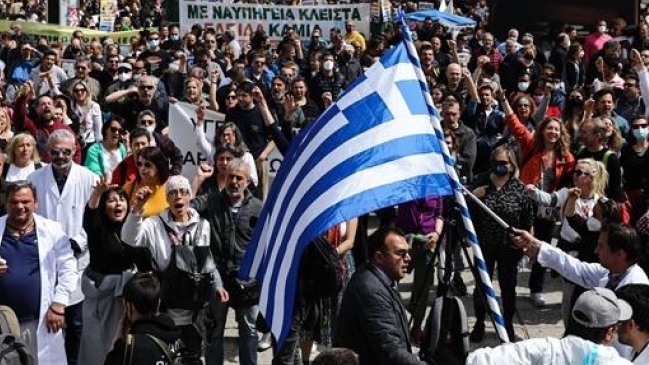live Middle East conflict: Key developments on Wednesday as U.S. submarine sinks Iranian warship
A torpedo from a U.S. submarine sunk an Iranian warship off the coast of Sri Lanka, U.S. Secretary of Defense, Pete Hegseth told reporters as ...

Greek journalists launched a 24-hour strike, halting news nationwide to demand better pay, safer conditions, and press freedom. The protest highlights a media crisis as the country faces broader labor unrest and calls for systemic reform.
Journalists in Greece staged a 24-hour strike on Tuesday, halting news coverage across television, radio, and online platforms in a bid to secure better working conditions and improved pay. The strike, organised by various journalist associations, aims to highlight the deteriorating state of the media industry and press for a new collective labour agreement.
The unions are calling for a minimum starting salary of €1,250 ($1,370), 10% wage increases, compensation for weekend shifts, and additional allowances for assignments in high-risk areas like conflict zones and disaster-stricken regions. Journalists have also demanded an end to the chaotic working environment that they say undermines both their livelihoods and the freedom of the press.
The strike coincides with a wider political climate of dissatisfaction, as Greece prepares for a nationwide general strike on Wednesday, affecting both public and private sector workers. Journalists’ unions argue that without substantial changes, the industry's ability to provide reliable news to the public will continue to be compromised.
As the strike disrupts news flows, the call for reforms in the media sector is gaining traction, with the unions demanding a fairer and more stable environment for press professionals.
U.S. President Donald Trump said the U.S. military has enough stockpiled weapons to fight wars "forever"; in a social media post late on Monday. The remarks came hours before conflict in Iran and the Middle East entered its fourth day.
U.S. first lady, Melania Trump chaired a UN Security Council meeting on children and education in conflict on Monday (2 March), a move criticised by Iran as hypocritical following U.S. and Israeli strikes that triggered a UN warning about risks to children.
A torpedo from a U.S. submarine sunk an Iranian warship off the coast of Sri Lanka, U.S. Secretary of Defense, Pete Hegseth told reporters as the Iranian conflcit entered its fifth day on Wednesday.
The U.S. embassy in Riyadh was hit by two drones resulting in a limited fire and some material damage, the kingdom's defence ministry said in a post on X on Tuesday, citing an initial assessment.
Shahid Motahari Sub-Speciality Hospital in northern Tehran and parts of the Golestan Palace were bombed on day two of the U.S.‑Israel strikes. AnewZ Touraj Shiralilou is in Iran's capital city and said that the facility was flattened in an airstrike.
U.S. Defense Secretary Pete Hegseth says the United States is making gains in its conflict with Iran after a key Iranian naval target was destroyed, confirming that the strike was carried out by a U.S. submarine off the coast of Sri Lanka. Rescue efforts are now under way for the ship’s crew.
Start your day informed with AnewZ Morning Brief. Here are the top news stories for the 4th of February, covering the latest developments you need to know.
Strikes across the Middle East are intensifying, fuelling travel disruption, driving up global energy prices and forcing diplomatic missions to shut their doors.
U.S. President Donald Trump has said the United States has a “virtually unlimited supply” of munitions and is capable of sustaining military action indefinitely, as the conflict with Iran entered its fourth day.
The United Nations has called for an investigation into a deadly attack on a girls’ primary school in Iran, which Iranian officials say has killed more than 100 children. The U.S. has said its forces “would not” deliberately target a school.
You can download the AnewZ application from Play Store and the App Store.

What is your opinion on this topic?
Leave the first comment